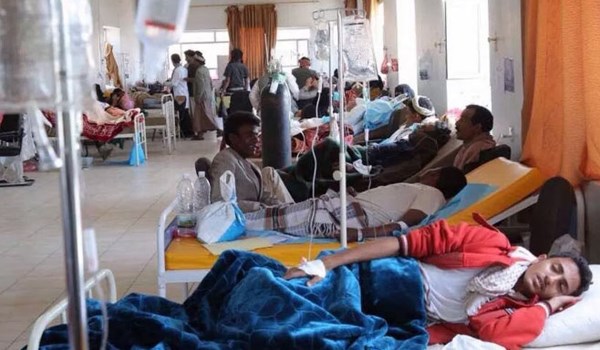Almost 500 Cases of Diphtheria in Yemen
YemenExtra
The World Health Organisation reported that almost 500 cases of diphtheria are suspected in Yemen.
Ibb and Hudaydah governorates are the worst hit by the disease, which can be spread through close physical and respiratory contacts, according to WHO Spokesman Tarik Jasarevic, reported.
“The overall case fatality ratio is 10 percent,” he added.
Aid officials said mid-December 2017, Yemen, ravaged by war, hunger and disease, saw a spike in diphtheria cases that will inevitably erupt into a larger, deadly outbreak because so few people were immunized.
“Left unchecked, diphtheria can cause devastating epidemics, mainly affecting children,” Jasarevic told the Thomson Reuters Foundation by email.
At highest risk are children, the World Health Organisation reported that most of the cases and deaths involved children who had not been immunised against the disease.
WHO and officials with Medecins Sans Frontieres (MSF) stressed that the diphtheria spread is inevitable in Yemen amid low vaccination rates, lack of access to medical care and so many people moving around and coming in contact with those infected.
Diphtheria could be more fatal than cholera – which Yemen is battling the epidemic that has infected about one million people – especially among unvaccinated children under five years old, according to MSF.
MSF also announced that as many as two in five diphtheria cases end in death, while, according to health officials, diphtheria spreads as easily as the common cold.
“There is the potential for a larger-scale outbreak of diphtheria, given that not everyone has been vaccinated,” Marc Poncin, emergency coordinator in Yemen for the medical charity, said.
Calling it “very worrisome,” Caroline Boustany, an aid worker with the International Rescue Committee, told the Foundation that “We have a spike in cases of a very easily preventable disease.”
“Even for patients who want to seek treatment, the blockade on fuel and consequent surge in prices means that they cannot afford to travel to the very few health centres still operational,” Poncin of MSF added.
Diphtheria is a bacterial infection spread from person to person by “droplets, like from coughing or sneezing,” according to the US Centers for Disease Control and Prevention (CDC). The disease causes a thick covering in the back of the throat and can be fatal.
The cholera outbreak in Yemen which began in April, has also claimed over 2,200 lives and has infected about one million people, as the nation has been suffering from what the World Health Organization (WHO) describes as the “largest epidemic in the world” amid a non-stop bombing campaign led by Saudi Arabia. Also Riyadh’s deadly campaign prevented the patients from traveling abroad for treatment and blocked the entry of medicine into the war-torn country.
Despite Riyadh’s claims that it is bombing the positions of the Ansarullah fighters, Saudi bombers are flattening residential areas and civilian infrastructures.
WHO

